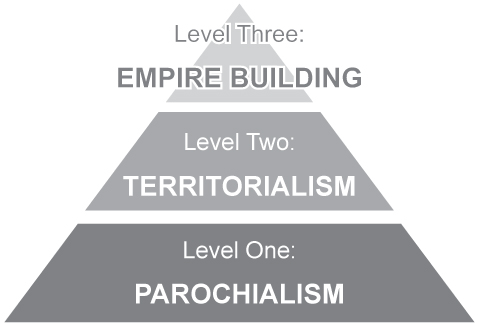This article is the third in a three-part series on the internal barriers that fear creates in organizations: parochialism, territorialism, and empire building.
Empire building is the pinnacle and most extreme level of the pyramid of bureaucracy . . . (It) occurs when one group attempts to regain or enhance its self-sufficiency by encroachment or by expanding its span of control even when that is not in the best interest of the organization.

There are several signs that empire building has begun: Departments compete for IT initiatives. Recruiting may become backlogged. Leaders either directly or indirectly control other independent groups by "speaking for them"; by claiming the right to prioritize time or resources for different departments; or in empire building's most severe form, by creating duplicate functions of their own.
Empire building cannot exist without parochialism and territorialism. The preconditions for empire building are endemic fear, different views of success, tight control over resources, and lack of shared accountabilities -- the bricks and mortar of parochialism and territorialism. When faced with parochial and territorial colleagues and the barriers they build, managers might feel that they have no other choice but to build empires.
But empire building is not the same as parochialism and territorialism. Parochial managers do not necessarily want to take control over other departments. Instead, they build walls against others' empire building attempts to keep outsiders from interfering with their own local focus and viewpoint. Territorialism is about keeping things just the way they are; empire building is about changing the balance of power. While territorialism seeks to impose limits over what people can do inside the silo, empire building seeks to change the focus of what those in other departments do. Territorialism is about defending the current span of control, but empire building is about expanding it.
Acquisition and expansion
Empire building can take many forms, but it's fundamentally about acquisition and expansion. Empire builders are driven to take over headcount, information, budgets, decision rights, or other resources. When they do, it creates inefficiency, conflict, and disengagement -- and it wastes resources. Instead of worrying about a competitor taking over a segment of the market, empire builders worry about asserting control within their own companies. Time and money end up being directed at internal turf wars rather than at external competition. Empire building is not the valid consolidation of oversight, but rather the deliberate attempt to improve one group's self-sufficiency at the expense of another group's success. The costs to an organization can be enormous.
For example, a multibillion-dollar company centralized several support functions under its head of human resources. As a result, that executive became chief administrative officer over human resources, accounts payable, legal, real estate, and several other departments. Although the IT needs of the businesses were specialized in research and development, she insisted that IT should also be under her charge and successfully fought to add IT to her growing empire. The outcome was inefficiency, wasted resources, disengagement, and lack of focus, all of which resulted in unnecessary costs for the organization.
One financial services company decided to expand its suite of products in an effort to grow customer relationships and revenue. The company created a new products group in the customer service organization to lead the charge and to act as a liaison between marketing, sales, and service in developing and launching new add-on products and services. In creating these services and programs, the company had to expend significant resources to reprogram the customer databases, the interactive voice response (IVR) system, and the website. If those changes were not implemented, it would be difficult for the new products group to hit its objectives. Unfortunately, there was a long list of IT initiatives scheduled to be completed first.
In the face of this loss of self-sufficiency, the new products group decided to hire its own programmers, testing staff, and computer support personnel, even though others in the customer service group were simultaneously changing the same programs. This redundancy led to immense waste: duplicate headcount, conflicting IT priorities, systems problems, and the need for management to constantly referee. It was only after a costly restructuring -- in which nearly 100 manager and supervisory positions were eliminated -- that the organization addressed the problem. Duplicate functions require duplicate headcount and budgets. In a few isolated cases, this may be justified, but in most cases, it's simply wasteful and inefficient.
Fear of failure
The financial costs are just the beginning. When two separate groups control the same function, inevitably they will want to go in different and sometimes conflicting directions. Groups might hide information or plans from another group just because they know the other group would object, possibly resulting in bad feelings or broken internal partnerships. This forces management to step in to arbitrate, wasting even more time and resources.
The desire to build empires does not necessarily stem from greed. It stems from the fear that unless a group seizes control from others, the project or the group will fail in some way. Often, organizations will permit or overlook an empire builder's encroachment because he presents his attempt at conquest as a faster way to meet an objective. In other cases, the empire builder is more subtle, taking over inch by inch. By the time anyone notices, the change has already occurred.
At that point, leadership may decide that it's easier just to let the groups fight it out, regardless of the long-term consequences or barriers that may result. But make no mistake, if empire building meets the needs of one group at the expense of another, it will harm the organization.
The Barriers That Fear CreatesBarrier: A policy, practice, or behavior that limits the success of an individual, group, or organization. Empire building: Attempts to assert control over people, functions, or resources in an effort to regain or enhance self-sufficiency. Parochialism: A tendency to force others to view the world from only one perspective or through a narrow filter, when local needs and goals are viewed as more important than broader objectives and outcomes. Territorialism: Hoarding or micromanaging internal headcount, resources, or decision authority in an effort to maintain control. |
